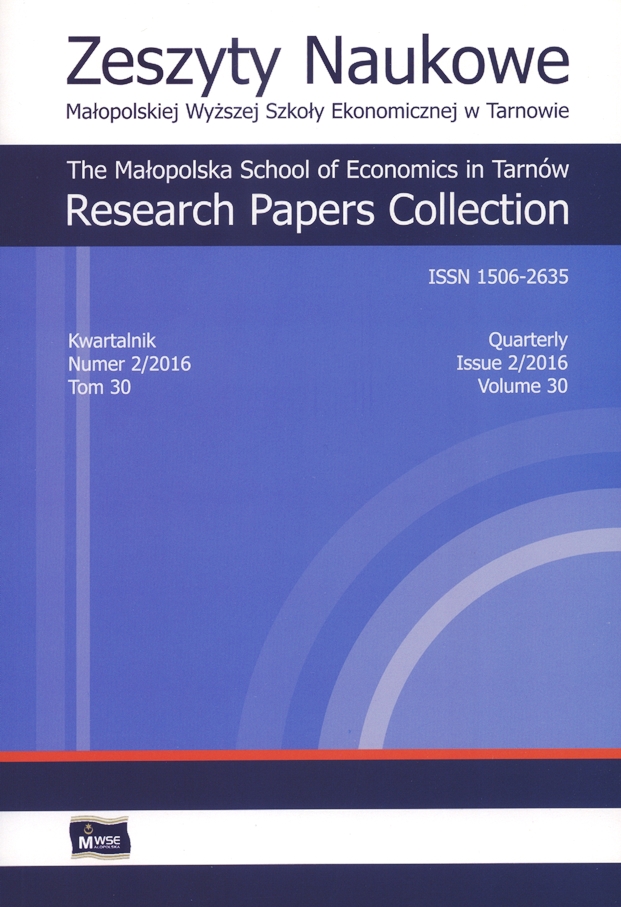Abstract
The article tells about desired competences among employees on the example of companies in aviation industry in Bielsko-Biała region. The introduction shows ratings of competences presented in different views of literature by specified authors. Further part of dissertation presents results of empirical research carried out by the end of 2014. The aim of research was to collect information on desired competences which are most often indicated by the employees who are not in management position in aviation industry and compare them with results of the first stage of research (executives). Subject research were companies of aviation industry. As a research tool questionnaire has been used. Results indicate high score, given by the staff in non-management position, related to education, profession needed on the market and professional experience. Tested respondents also pointed out features/abilities which are most useful in professional work, these mainly include systematic approach and diligence. The compiled results from part I and II of the elaboration shows that tested respondents differently evaluate competences within their usefulness in professional work. As a consequence there is an increasing number of people who do not have appropriate competence to perform specific tasks in the workplace.
References
Armstrong, M. (2007). Zarządzanie zasobami ludzkimi. Warszawa: Wolters Kluwer Polska. ISBN 978-83-7526-171-4.
View in Google Scholar
Boyatzis, R.E. (1982). The Competent Manager: A Model for Effective Performance. New York: John Wiley and Sons. ISBN 978-0-471-09031-1.
View in Google Scholar
Cockerill, T., Hunt, J., Schroder, H. (1995). Managerial Competencies: Fact or Fiction? Business Strategy Review, 6(3), 1–12.
View in Google Scholar
Filipowicz, G. (2004). Zarządzanie kompetencjami zawodowymi. Warszawa: PWE. ISBN 83-208-1532-0.
View in Google Scholar
Kubicka-Daab, J. (2002). Budowa modeli kompetencji. W: A. Ludwiczyński (red.). Najlepsze praktyki zarządzania kapitałem ludzkim (s. 239–248). Warszawa: Polska Fundacja Promocji Kadr. ISBN 83-916607-3-7.
View in Google Scholar
Mikuła, B. (2001). W kierunku organizacji inteligentnych. Kraków: Antykwa. ISBN 83-87493-66-X.
View in Google Scholar
Mikuła, B., Pietruszka-Ortyl, A. (2007). Kompetencje pracowników w perspektywie strategicznego zarządzania wiedzą w przedsiębiorstwie. Zeszyty Naukowe Akademii Ekonomicznej w Krakowie, 747, 49–73.
View in Google Scholar
Orlińska-Gondor, A. (2006). Zarządzanie ludźmi oparte na pojęciu kompetencji. W: L. Zbiegień-Maciąg (red.). Nowe tendencje i wyzwania w zarządzaniu personelem (s. 168–191). Kraków: Wolters Kluwer Polska. ISBN 83-7484-028-5.
View in Google Scholar
Pocztowski, A. (2003). Zarządzanie zasobami ludzkimi. Strategie – procesy – metody. Warszawa: PWE. ISBN 83-208-1468-5.
View in Google Scholar
Sidor-Rządkowska, M. (2008). Zarządzanie kompetencjami – teoria i praktyka. Zarządzanie Zmianami, 9(20), 1–10.
View in Google Scholar
Szczęsna, A., Rostkowski, T. (2004). Zarządzanie kompetencjami. W: T. Rostkowski (red.). Nowoczesne metody zarządzania zasobami ludzkimi (s. 37–76). Warszawa: Difin. ISBN 83-7251-445-3.
View in Google Scholar
© Copyright by Małopolska School of Economics in Tarnów. The articles are available under the Creative Commons Attribution NonCommercial-NoDerivatives 4.0 International License


